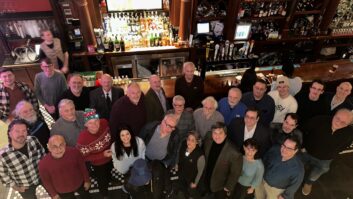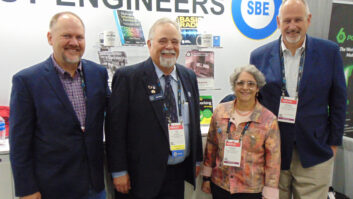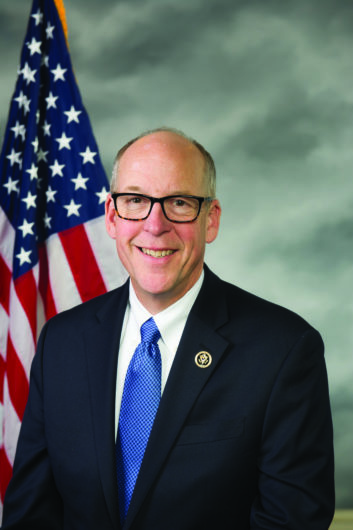
Rep. Greg Walden, Republican from Oregon, knew the question was coming before it was asked. After all, as soon as he’d announced that he would not seek another term in 2020, people had begun to wonder if the former radio owner might not have his eye on eventually becoming leader of the National Association of Broadcasters.
“There was all this speculation that Gordon Smith was resigning and that was why I was stepping aside,” said Walden with a chuckle, referring to the current president/CEO of NAB.
“No. It’s none of the above. Look, I love broadcasting. It’s in my veins. It shows on my soldering iron-burned hands. I grew up in broadcasting and it’s a great industry.”
Walden, 62, will leave Congress in January 2021. He came to the Hill in 1998 and most recently has been the top Republican on the House Energy and Commerce Committee, which maintains principal responsibility for legislative oversight relating to telecommunications. That means Walden is intimately aware of the issues facing the broadcast industry.
SAVVY AND SERIOUS
Much of the media coverage of Walden’s decision focused on the outlook for the GOP in next year’s elections.
Politico put it this way in late October: “The Oregon congressman is the 19th House Republican to announce they are retiring at the end of this Congress, a sign of how difficult it will be for the GOP to win back the majority in what’s already shaping up as a tough 2020 election. Having President Donald Trump’s name at the top of the ticket will ensure turnout among his supporters, yet it’s also expected to bring Democrats out in huge numbers as well.”
Politico characterized Rep. Walden as “well-respected by colleagues from both sides of the aisle, who describe him as both a savvy politician and serious legislator who likes to dig into the nitty-gritty policy details.” It noted that he is a former chief of the House GOP’s campaign arm who “earned a reputation for party loyalty over his past two decades in Congress” but said he “has been quietly picking and choosing his battles with Trump this year, fueling speculation he might be eyeing the exits.”
Specifically, it reported, Walden “rebuked the president over the hugely controversial border wall project, backed Russia sanctions over Trump’s objection, voted with Democrats to end the historic 35-day government shutdown and has been vocal about addressing climate change. But Walden also has stood by Trump throughout the Ukraine scandal and fallen in line on other key issues.”
WHERE’S WALDEN?
NAB released a statement regarding Walden’s retirement from Smith, a former U.S. senator: “I was lucky to have served with Greg Walden in both the Oregon legislature and in Congress, and can honestly say he is one of the finest public servants I’ve ever known. Greg’s career has been defined by success — as a committed local broadcaster, as a bipartisan political bridge builder and as a brilliant legislator,” he said.
“Congress is a better place because of Greg Walden, and I’m certain he will make a positive difference in whatever path his future may hold.”
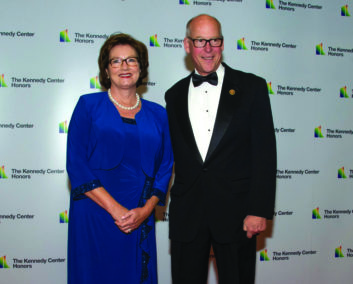
Photo by Ron Sachs-Pool/Getty Images
Walden and his wife Mylene owned and operated a group of radio stations for more than two decades in Hood River, Ore., until 1998. The town is in the Columbia River Gorge. Earlier, Walden worked at stations his parents owned. His duties included working on air, doing traffic and even a little engineering. Walden also is a licensed amateur radio operator (W7EQI).
In his role on the House Energy and Commerce Committee, Walden worked to “pass legislation to grow American jobs by expanding access to wireless broadband, spur new U.S. technology and innovation and protect the Internet from government control,” according to his official bio.
Speaking with Radio World, Walden reflected on his time in Washington and the current regulatory environment. Some replies have been edited for length and clarity.
Radio World: How did your radio background give you unique perspective on items that came before the House Energy and Commerce Committee?
Rep. Greg Walden: As a community broadcaster who owned radio stations for 20 years and who grew up in a family of broadcasters. In fact my father was a broadcaster going back to the 1930s, so you really learn about listening and learning about people in your community. It’s about localism. All of those things that broadcasters do so well. Those principles and the engrained institutionalized service to community really served me well when I came to Washington.
As a broadcaster I did sales calls. I wrote ads. I did news. All of those things helped me because it taught me how to be in touch with the community. That helped me politically. And did give me an insight into the issues broadcasters still face today.
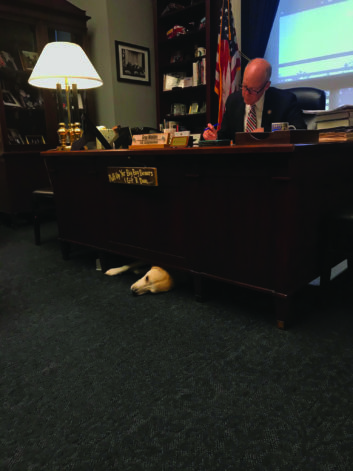
RW: What are your views on the state of government regulation in the lives of broadcasters?
Walden: There is a place for regulation. We don’t want pirate radio stations crashing on top of licensed radio stations. I think under this FCC and the leadership of [Chairman] Ajit Pai and [Commissioner] Mike O’Rielly, they have really recognized the need to get rid of unnecessary regulation.
I’ve talked to Chairman Pai about our experience as broadcasters and the things we needed to do and the unnecessary parts. We had a public file that no one looked at except for the occasional FCC inspector. It’s important that we get to the things that matter, and not burden local broadcasters with things that no one cares about in today’s age.
RW: What is your position on performance royalties? Should radio be paying artists to play their songs?
Walden: I think artists benefit terrifically by broadcasters getting their music out to listeners. We already — and I say “we” because I still talk in the broadcaster’s vein — we are already paying a lot of money to the record companies. My preference is to have them figure it out amongst themselves.
RW: NAB is on record as saying they would prefer the Department of Justice defer to Congress to determine any material changes needed to the music licensing structure. Could that happen?
Walden: I can’t say. I know the pressure seems to have grown on radio broadcasters since online music services began paying performance royalties. Right now it’s in the DOJ’s hands.
RW: What do you think about the pending deregulation proposals before the FCC?
Walden: I watched what happened after the 1996 Communications Act and I think it really helped provide the market share that was necessary to allow for stations to group up. That happened in our case. We went from two, then three and finally five radio stations. The ones we purchased were not doing that well. And by the time we were done we had a synergy to allow for a more competitive group.
We have a hugely competitive marketplace these days, and I want broadcasting to be able to grow and flourish and serve their local communities. There has been a lot of debate about national caps and such. So there is much to be discussed, but we have to make sure we maintain the viability of broadcasting. We don’t want to go the way of newspapers. It’s important there is competition and not have monopolies, but we want competition designed in this era and not the 1940s and 1950s era.
RW: You’ve said you’ve been watching spectrum issues and especially the battle over dividing up the C-Band. Are you worried about the damage that could be done to established downlinks for broadcast?
Walden: Yes, absolutely. In fact we have had subcommittee hearings over which way to go and how much to divide up. We are having a vibrant debate about which direction to go and how much spectrum should be freed up. We need to stay ahead of the 5G rollout in this country to make sure it works.
I think there is a way to accommodate that and still make sure broadcasters using the mid-band spectrum can continue to get the programming they need without interference. There are different options to make that happen.
I met with the head of the Congressional Budget Office recently on this very topic. They are looking at whether an auction performs better for taxpayers or a private sale. [FCC Chairman Ajit Pai subsequently signaled that he plans to seek a public auction of C-band spectrum. — Ed.]
We are working our way through it. I’m still in the information-gathering mode. I know I don’t want rural areas of America to go under-served all of a sudden because you don’t have the bandwidth anymore. I don’t want interference. Some of it could be replaced by fiber but not all of it. I represent some very rural areas where fiber just wouldn’t work for broadcasters to continue receiving programming.
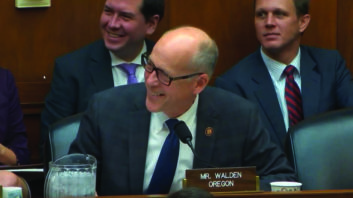
RW: You’ve been critical of the FCC in the past when it was under different leadership, saying it was not transparent enough. Has that aspect of FCC operations under Chairman Pai improved?
Walden: Oh yes. There were periods under previous leadership when the FCC was antagonistic and almost hostile toward broadcasters. I think that has changed greatly. That’s very encouraging. True, the FCC is the cop on the beat, and if you are a licensee you have certain obligations that have to be met. But my experience as a former broadcaster and as former president of the Oregon Broadcasters Association years ago, I think this commission recognizes the amount of community service radio provides.
RW: Another FCC question. They have been criticized by some as being slow to move on AM revitalization. Is the FCC doing enough to help AM radio?
Walden: I was the owner of two AM stations. One was a former daytime that we were eventually allowed to drop to about 13 watts to remain on the air 24/7. Another was a 1,000 kW AM. I want to see AM survive and thrive. It’s especially important for new entrants into broadcasting, the diversity of programming.
It certainly has been slow-moving, but it has been an initiative of Chairman Pai to get it done. It is one of those things on my bucket list to try and get it into a better place.
RW: What do you hear from the White House? And what is their view on broadcast industry priorities?
Walden: I think it is pretty positive. I have several former staffers in the White House working on communication issues. They understand the importance of having a vibrant broadcast community. We are all looking at what is next. They are aware of the C-band spectrum issues.
As for radio, this is an administration and a president that is a big fan of broadcast in general.
RW: You were chair of the House Energy and Commerce Committee when Republicans held the majority in the House. Can you reflect on issues broadcast you tackled?
Walden: I think we had a good run of it. On the TV side, the digital transition, we were able to go back and get another $1 billion to help cover the transition costs. We really dug in to make sure that with changes in the tax laws that we didn’t lose the deductibility of advertising. That was a big threat to broadcast and other industries that depend on advertising.
I think I’ve been helpful in efforts to enact good public policy that has been a positive for the broadcast industry.
RW: You were a vocal supporter of getting FM chips into cell phones. Could you have pushed any harder on that, short of a mandate?
Walden: Well, that was the nuclear weapon, mandating something, especially a new technology. We haven’t done that in other areas. When you begin putting in federal mandates, especially on technology, it can create a whole bunch of unintended consequences and legacies. And I don’t think we could have passed that through Congress anyway.
I did use my bully pulpit the best I could to nudge these companies into adopting the FM chip. Even with my limited engineering experience, I was able to push back on their weak arguments. We made some progress. It’s just unfortunate we didn’t get it into the iPhone. I never understood why (Apple) didn’t go down that path.
RW: You’re 62 years old. What will you do next when your term expires early 2021?
Walden: I’ve enjoyed the 30 years of public service, counting my time in the state legislature in Oregon. But my wife and I, while we have enjoyed it, we are ready to close the chapter on public life. I’d like to do something else, but I don’t know what that will be. I’m ready to take on a new challenge.
RW: And there is nothing to the NAB rumors?
Walden: Gordon Smith is a dear friend. He’s a fellow Oregonian. We served together in the state legislature and in Washington. His contract runs through I think 2023, so he has a long time to serve yet in that role.
RW: Will you remain in the Washington area or live year round in Oregon?
Walden: Oregon is home. We still live in Hood River in the same house we bought in 1987, about five blocks from the radio stations we owned. It’s a great home. I don’t know the career path that is out there, but Oregon will always be home.
RW: Any thoughts about a return to broadcasting once you walk away from public service?
Walden: You know, I was speaking with Jeff Smulyan [founder and CEO of Emmis Communications] recently, and I asked him if there was an overnight shift somewhere, where I could work the board. He told me I could have a shift on the hip-hop station in New York City. I don’t see that happening!






